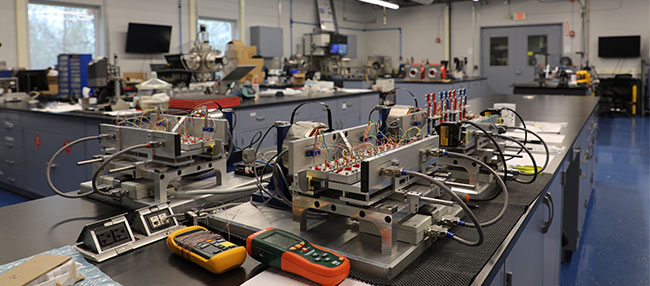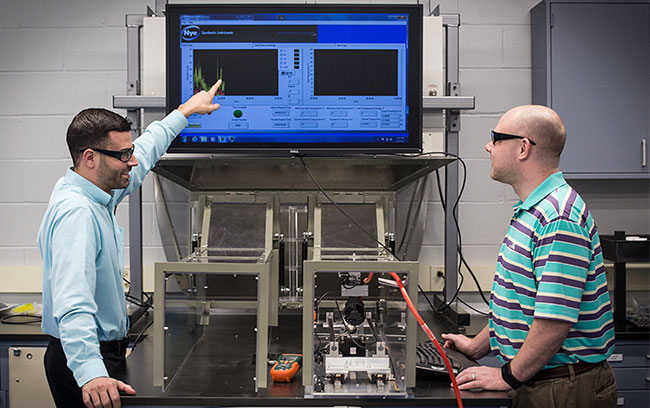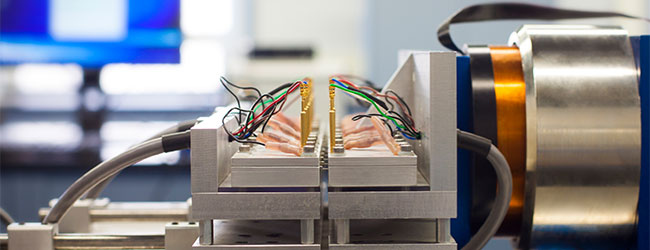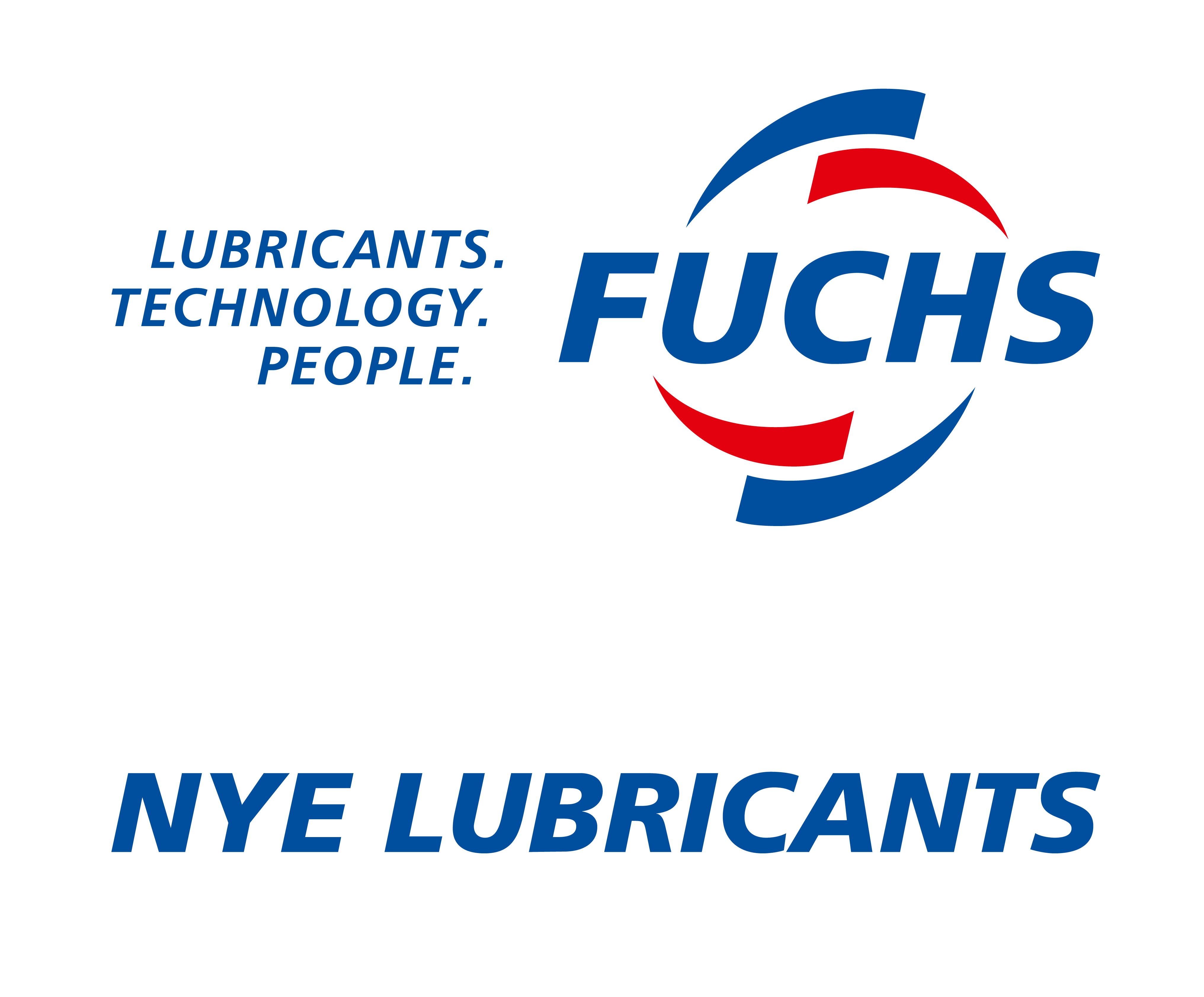ADVT Lab: The Road so Far
Five years ago, a new concept was born within the technical organization at Nye. The core of this idea was to create a technical competency and functionality that would bridge a gap seen between R&D and Product Development. This new functionality would focus on developing a better understanding of the fundamentals of lubricant applications and complex electrical and mechanical systems.

Customer products are typically developed and samples provided for customer testing based on physical property data and the experience of our Technical Support Engineers and Regional Engineering Managers. This places the majority of the testing burden in the customer’s hands as well as the costs. This is where the new ADVT group (Applications Development and Validation Testing) fits in.
The ADVT lab is currently focusing on two different modes of testing: Component Testing/Simulation and Applied Mechanics. The idea of the ADVT Lab began simply within the Technical group and was born with a single intern and some ideas on areas where we could expand our technical application knowledge at Nye. By gaining a better understanding of how lubrication systems function in dynamic applications, we believed we would be able to more accurately predict performance and supply our customers with better solutions.
The first areas targeted were within the Semi-Con industry looking at the vapor pressure and outgassing of materials as well as the dynamic particle generation of our products. In the clean room and semiconductor manufacturing world, cleanliness, outgassing, and contamination are critical factors. While standard vapor pressure testing has been around for decades, there are many methods in use and often many questions about how appropriate the model is.

The ADVT lab is working on a unified method for measuring the vapor pressure of lubricants first in a static and later in a dynamic environment. Dynamic Particle Generation is a new way to think about the lubricants you use in your clean room applications. Although many products are selected based on the particle cleanliness and filtration criteria, particle generation is just as important if not more. This property of a lubricating grease will tell you how many particles by size are generated in a dynamic environment. Based on this, the grease can be classified to an ISO or Federal air cleanliness standard which will give you the confidence to know just how many particles are being generated in your clean room, and to some customers’ surprise, our clean greases generate less particles than their air filtration systems.
In the Automotive world, fretting corrosion has been a severe problem for electrical terminals. There has been a lot of research around the world into this topic but many of the tests developed have been single terminal or employed a fretting motion through heat cycling. The ADVT group has developed an automated test system that can accurately move with a resolution down to 1 micron with a frequency of up to 100,000 Hertz. This test stand can measure 10 electrical terminals at once giving a good sample set and measures
the resistance through the terminal via a 6 ½ digit multimeter over 10 milliseconds looking for a discontinuity in the circuit which signifies a failure. One automotive industry expert who has been around the fretting phenomenon for over 20 years called this test rig developed by Nye’s ADVT group as the best he has ever seen.

Compatibility testing with either customer supplied materials or polymer dogbone specimens is another core function carried out by the ADVT lab where we can investigate the effects of our lubricants on different plastics and elastomers. By looking at the effects of heat and ageing on materials, we can predict if our customers will have any performance issues because of material incompatibilities. This has been very beneficial to many of our customers and has allowed us to make better product recommendations for their application.
We have expanded our focus and are now looking at different applications in various industries such as Automotive, Precision Bearing, Aerospace, Sports & Recreation, and Medical/Damping. In November 2014, the ADVT Lab construction was completed. This new roughly 2,000 square foot lab with a staff of 3 engineers and 2 engineering interns currently houses over 20 different types of tests. We now also have the ability to model and simulate applications as well as creating computational simulations for experimental system prediction. This allows us to have three types of tests depending on the needs of the project; Model/Simulation, Component Test, and Practical Test.
Some of our application capabilities are listed below but we also have many new and exciting ideas coming in 2015/2016 that link to Nye’s Strategic Technical Roadmap for future development plans. Through bridging the gap between the product development in R&D and working with customers in the field, the ADVT lab will mark the future for Technical Product Development and help to assure better partnerships with customers allowing our products to perform better in their applications.
Some of our current capabilities (Abbreviated List):
- Dynamic Particle Generation
- Knudsen Vapor Pressure
- Dynamic Bearing Corrosion
- Electrical Terminal Fretting (Low to High Frequency)
- Outgassing Contamination
- Water Spray Off
- Salt Water Washout (Dynamic Bearing)
- Vacuum Oil Separation
- Dynamic Sliding Torque (Ball screw or Steering Shaft)
- Electrical Contact Resistance
- Thermal Conductivity
- Tensile Strength & Sliding Force
- High Vacuum Environmental Testing
- Temperature & Humidity Stress Testing
For more information on the capabilities of the ADVT Lab or support with your application, please contact Nye Lubricants, Inc.


